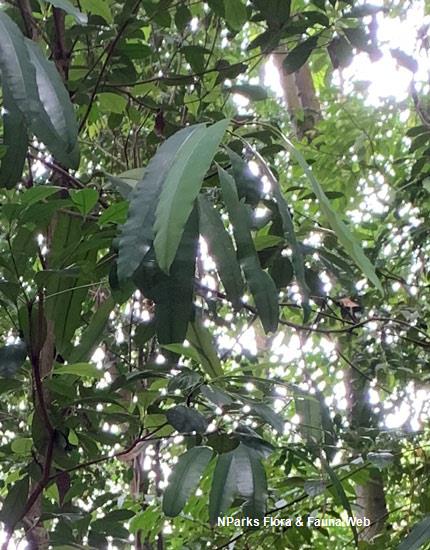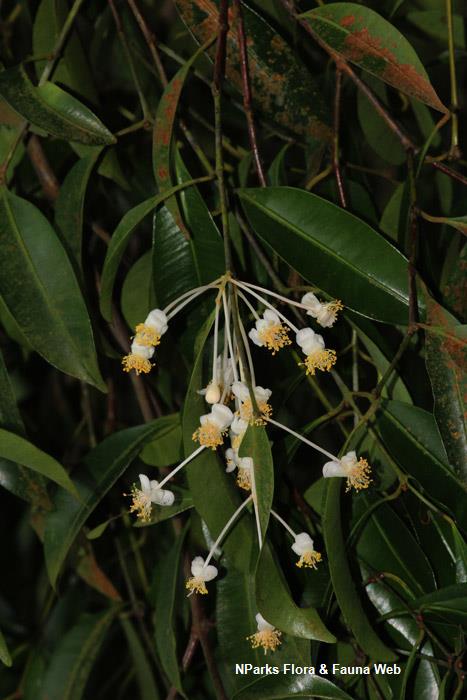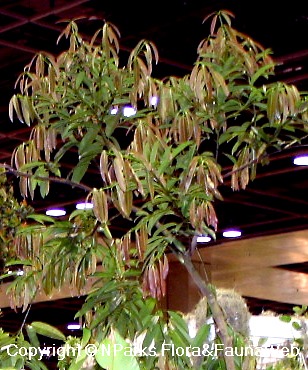
Back
Calophyllum macrocarpum Hook.f.
| Family Name: | Calophyllaceae |
| Synonyms: | Calophyllum horstii Boerl. |
| Common Name: | Bintangor Bunut, Bintangor Rimba, Bentangur Batu, Bunut, Buru, Danko, Chuat, Tang Hon |
Name
Classifications and Characteristics
| Plant Division | Angiosperms (Flowering Seed Plants) (Dicotyledon) |
|---|---|
| Plant Growth Form | Tree (Big (>30m)) |
| Lifespan (in Singapore) | Perennial |
| Mode of Nutrition | Autotrophic |
| Plant Shape | Oval, Irregular |
| Maximum Height | 45 m |
Biogeography
| Native Distribution | Peninsular Malaysia, Singapore, and Borneo |
|---|---|
| Native Habitat | Terrestrial (Primary Rainforest, Secondary Rainforest, Riverine, Freshwater Swamp Forest) |
| Preferred Climate Zone | Tropical |
| Local Conservation Status | Native to Singapore (Critically Endangered (CR)) |
Description and Ethnobotany
| Growth Form | It is a very tall emergent forest tree, up to 45m height. Crown somewhat irregularly pendulous, with drooping branches. |
|---|---|
| Trunk | Up to 5m girth and more than 1m in diameter for mature trees. No buttresses. Bark yellowish-brown, exudes yellow to white sap when injured. |
| Foliage | Its stalked, oppositely arranged leaves are oblong with entire leaf margins and prominent parallel secondary veins. Each leaf measures 10-24 cm long and 3-7 cm wide. Young leaves emerge reddish-brown with contrasting yellow mid-rib. |
| Flowers | Its white-petaled flowers are 3 cm wide, borne on clusters of 6-10 in an inflorescence. |
| Fruit | Its fruits are large fleshy drupes, up to 14 cm long and 7cm wide, ellipsoid- ovoid, with fragrant juicy pulp and single fibrous seed. Eaten by squirrels and other forest vetebrates in the wild. |
| Habitat | It grows on hillsides, low undulating land, ridges, and seasonal swamp forests. It occurs locally at Bukit Timah Nature Reserve. |
| Associated Fauna | Its flowers are insect-pollinated. Its fruits are eaten by squirrels and other forest herbivores. |
| Cultivation | Hardy species, tolerant of sandy to clayey soils. Propagate by seeds, stem cuttings or air-layering. |
| Etymology | Genus epithet 'Calophyllum' derived from Greek terms 'kalos' (beautiful) and 'phyllon' (leaf), a reference to the ornamental foliage. Species epithet 'macrocarpum' means 'large-fruited', describing the tree's relatively large fruits. |
| Ethnobotanical Uses | Edible Plant Parts : Edible Fruits Food (Fruit or Vegetable): Its fruits are edible, and has a scented juicy pulp. Timber & Products: Its timber is very durable, regarded as one of the best produced by Calophyllum species. Used to construct houses, posts, stakes and masts, as well as to make household products like sago pounders. |
Landscaping Features
| Landscaping | It is suitable for streetscapes, parks and gardens for its attractive young foliage and fragrant white flowers. |
|---|---|
| Desirable Plant Features | Ornamental Foliage, Ornamental Flowers, Fragrant |
| Landscape Uses | Suitable for Roadsides, General, Parks & Gardens, Small Gardens, Riverine |
| Thematic Landscaping | Naturalistic Garden |
Fauna, Pollination and Dispersal
| Fauna Pollination Dispersal Associated Fauna | Caterpillar Moth Food Plant |
|---|---|
| Pollination Method(s) | Biotic (Fauna) |
| Seed or Spore Dispersal | Biotic (Fauna) |
Plant Care and Propagation
| Light Preference | Full Sun |
|---|---|
| Water Preference | Moderate Water, Lots of Water |
| Plant Growth Rate | Moderate |
| Rootzone Tolerance | Fertile Loamy Soils, Well-Drained Soils, Poor Infertile Soils, Acidic (low pH) Soils, Moist Soils, Waterlogged Soils (Drains Site) |
| Maintenance Requirements | Moderate |
| Propagation Method | Seed, Stem Cutting, Air-Layering |
Foliar
| Foliage Retention | Evergreen |
|---|---|
| Mature Foliage Colour(s) | Green |
| Mature Foliage Texture(s) | Glossy / Shiny, Leathery |
| Young Flush Texture(s) | Smooth |
| Foliar Type | Simple / Unifoliate |
| Foliar Arrangement Along Stem | Opposite |
| Foliar Attachment to Stem | Petiolate |
| Foliar Shape(s) | Non-Palm Foliage (Oblong) |
| Foliar Venation | Pinnate / Net |
| Foliar Margin | Entire |
| Foliar Apex - Tip | Acuminate |
| Foliar Base | Cuneate |
| Typical Foliar Area | Notophyll ( 20.25cm2 - 45 cm2 ) |
| Prominent Young Flush Colour(s) Remarks | Reddish-brown |
Non - Foliar and Storage
| Trunk Type (Non Palm) | Woody |
|---|---|
| Bark Colour(s) | Yellowish Brown |
| Mature Bark Texture | Lenticellate |
| Stem Type & Modification | Woody |
| Root Type | Underground (Tap Root, Fibrous Root) |
Floral (Angiosperm)
| Flower & Plant Sexuality | Bisexual Flowers |
| Flower Colour(s) | White |
|---|---|
| Flower Grouping | Cluster / Inflorescence |
| Flower Location | Axillary |
| Flower Symmetry | Radial |
| Flowering Habit | Polycarpic |
Fruit, Seed and Spore
| Mature Fruit Colour(s) | Green - Light Green |
|---|---|
| Fruit Classification | Simple Fruit |
| Fruit Type | Fleshy Fruit , Drupe |
Image Repository
Others
| Master ID | 29349 |
|---|---|
| Species ID | 3658 |
| Flora Disclaimer | The information in this website has been compiled from reliable sources, such as reference works on medicinal plants. It is not a substitute for medical advice or treatment and NParks does not purport to provide any medical advice. Readers should always consult his/her physician before using or consuming a plant for medicinal purposes. |

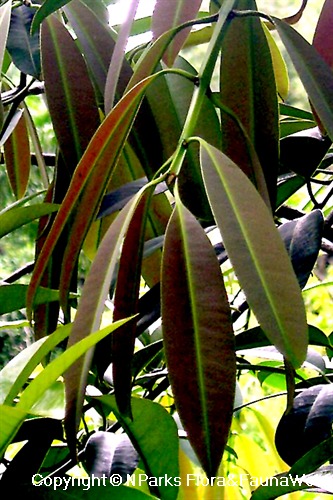
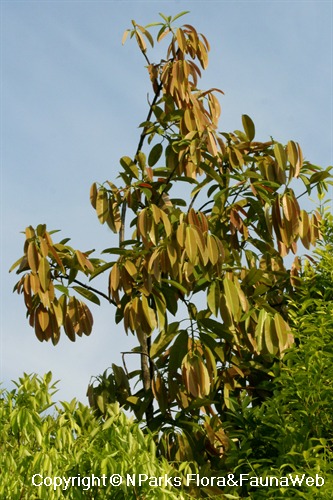
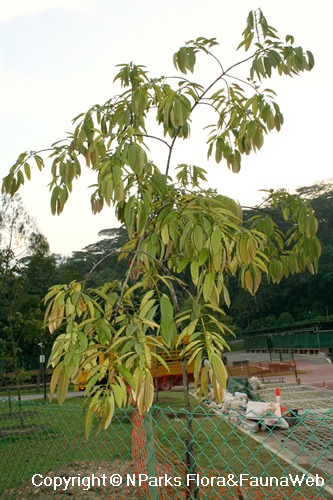
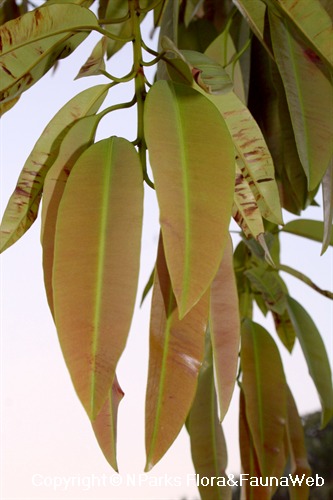
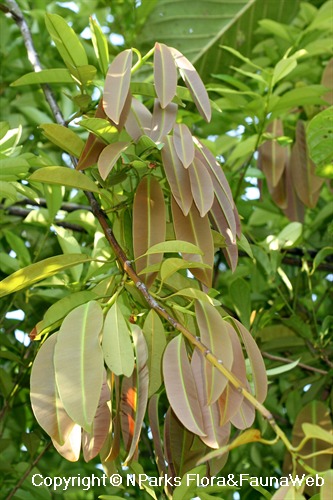
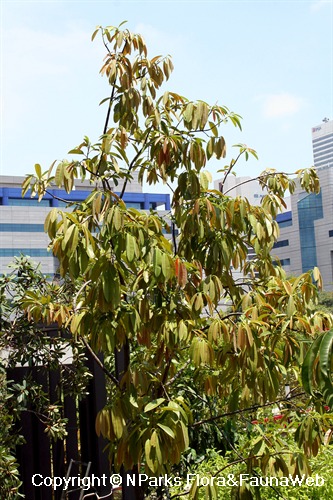
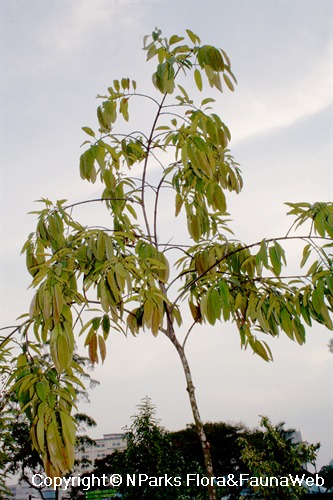
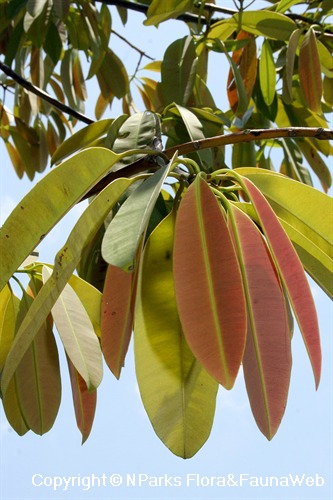
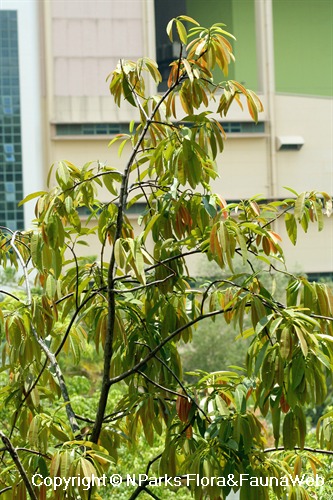
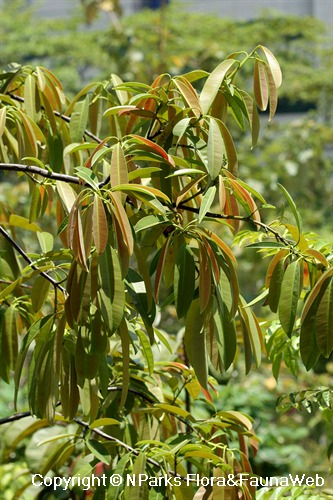
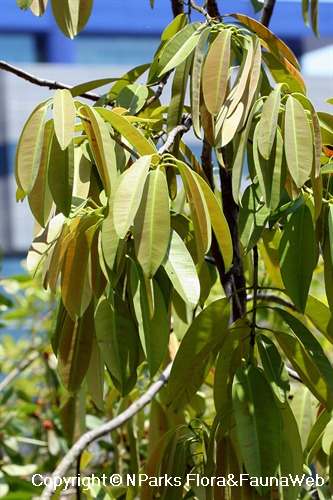
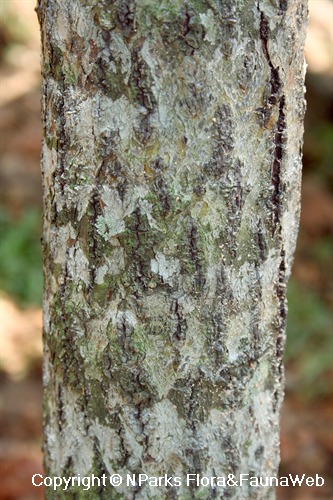
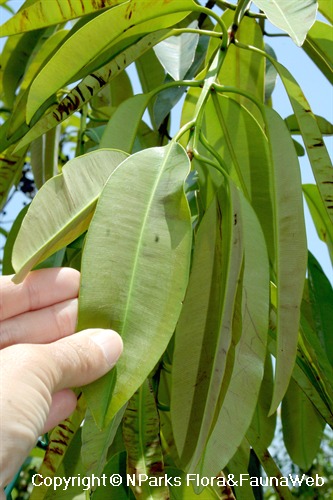
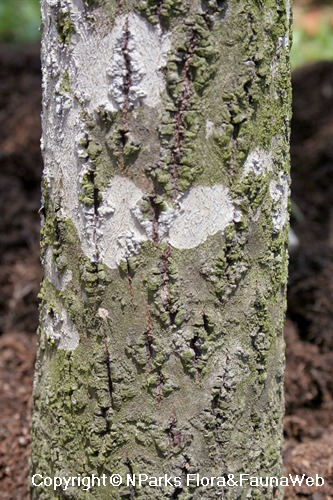
_lowres.jpg)
